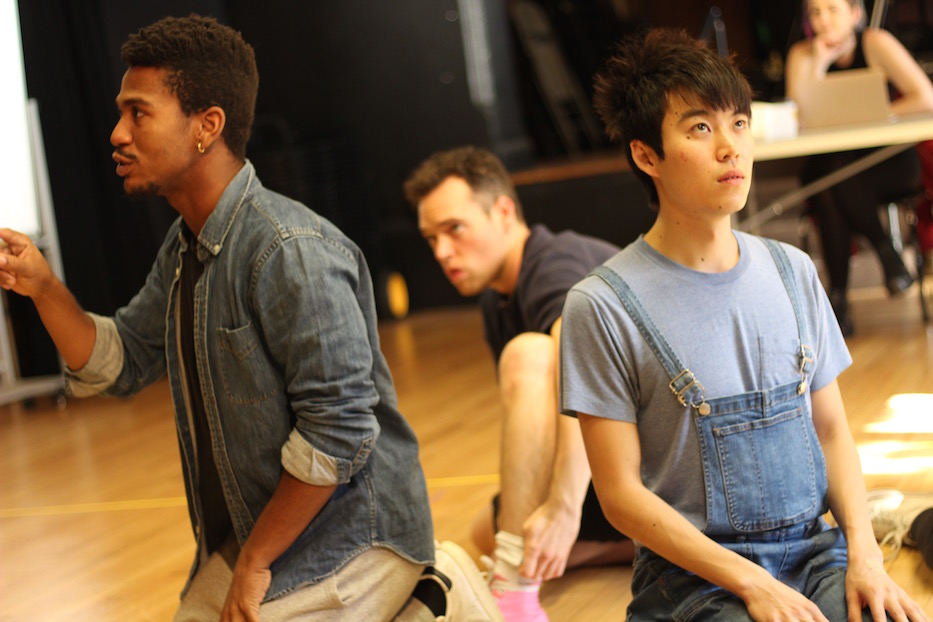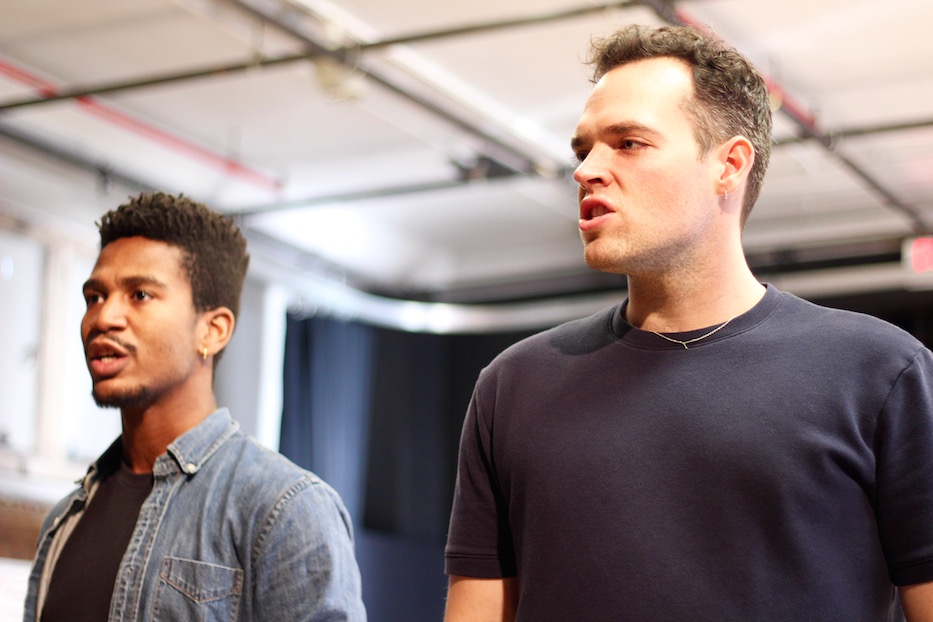
Arts & Culture | Theater | Yale Cabaret
/BurnBook%20-%202.jpg)
| Gregory Saint Georges, Daniel Liu and JJ McGlone (in background) in Burn Book at the Yale Cabaret. Lucy Gellman Photos. |
In a little room on Park Street, something witchy and wicked was blowing in with the fall. Lyrics oozed onto the floor, catching on a violin. Bodies glided in from all four corners of the room and began to writhe. Cello throbbed through a speaker.
They say I did something bad/Then why's it feel so good?
They say I did something bad/But why's it feel so good?
“Touch yourselves, touch yourselves,” said Director Zoe Mann. “And like, violate the audience with your eyes.”
These moments are regular in JJ McGlone’s Burn Book, a macabre, witchy and very queer mashup of Andrew Fleming’s 1996 The Craft, Arthur Miller’s 1953 The Crucible, and Tina Fey’s 2004 Mean Girls coming to the Yale Cabaret this week. As it opens on Halloween, the play strikes a timely note, a funny and cutting retelling of the three works that is also a reclamation. It features an all male and non-binary cast in place of the women who populate all three of its source texts.
It runs Oct. 31 through Nov. 2; tickets and more information are available here.

| Gregory Saint Georges and JJ McGlone. |
“The parallels between the queer experience and witches in history kind of line up,” said McGlone in a recent interview. “Both were condemned by the church. Both were literally burned for who they were.”
Pulling heavily—and with biting humor—from its source texts, Burn Book opens on a dorm room at a buttoned-up, Catholic boarding school, where it seems that something sinister is already afoot. Lewis (Daniel Liu), Warren (Julian Sanchez) and William (McGlone) have reunited after a summer away from each other, so excited that their hugs become cacophonous, jumping ordeals.
When a fourth wanders in and introduces himself as Ty (Gregory Saint Georges), it’s clear that the others are going to take a minute to adjust. But they do—especially after they learn that he, like them, is gay. And a witch, with a big heavy black book of spells that he keeps hidden next to his bed until William finds it. Which is where the trouble, from teacher hangups to legit witchcraft, begins.
Witchy worlds collapse on each other from the start: McGlone’s four characters are named after the ill-fated Abigail Williams, Mercy Lewis, Mary Warren and indentured servant Tituba that Miller brought to life over half a century ago, but they are just as quickly wayward schoolgirls Sarah Bailey, Bonnie Harper, Nancy Downs, and Rochelle Zimmerman of The Craft, or the pink-shirted plastic villains that terrorize a suburban Illinois high school in Mean Girls. And like those characters, they orbit each other with equal amounts of affection and distrust, unsure exactly of what power they might wield together and apart.
/BurnBook%20-%208.jpg)
There’s a lot of quotation—McGlone’s position as a fangirl to these works isn’t exactly subtle—but it feels right on time for both Halloween and a cultural moment in which queerness is lifted up in mainstream culture, then debated, demonized and actively persecuted in state and national legislatures, houses of worship, and sanctuaries that are turned into death traps.
At various moments, characters go right to the source. William is a dead ringer for Regina George as he admires Ty’s accoutrements, and Ty gets into the act just as quickly. When characters form a coven, it is all The Craft all the time, from self-parody to incantations that teeter on the edge of magic, and then fall right in. At times, McGlone and Mann are careful to pull the strings just enough, so it’s clear how deeply witchcraft is ingrained as metaphor.
But this is also a reclamation. Popular culture—certainly, Hollywood’s box office with its endless hetero appetite and gnashing teeth—has never made much room for queer and femme bodies that have power, agency, and dimensionality. So McGlone does.
With the help of swimmy, fantastical projections from Erin Sullivan and costumes from David Mitsch, characters live out a fantasy that both mainstream media and the stage have consistently denied them. They inject the script with short, dense confessions on their own queerness, so intimate it’s unclear whether the character or the actor is coming across.
/BurnBook%20-%205.jpg)
For a work that McGlone calls “really, stupidly gay,” Burn Book is also deeply thoughtful, sometimes with physical, dance-like movement and contortion rather than words. In one sequence near the beginning of the play, William inspects his likeness in the mirror, pushing in his chest and stomach as his face strains at the prospect of his own body.
It’s just a moment—followed by a group twerking lesson (kind of like this, but better) that is pretty golden—but the subtext hangs around long after a burst of music has died down. There’s an obsessive culture of performance and one-upmanship here, in which one’s disgust and stress over one’s body is just part of the routine.
In another particularly moving choice, McGlone also teases out the community’s distrust around Tituba/Ty, both of whom are products of the Afro-Caribbean diaspora. In both The Crucible and Burn Book, Tituba/Ty regards witchcraft not as amusement or retribution but holy rite, with which one must be careful and deliberate. As McGlone maps Miller’s character onto Ty, he doesn’t forget to add present-day racism, xenophobia, and disbelief that plague New Haven and the world.
Characters also aren’t entirely good at all, a choice McGlone said he made based both on the movies and the realities of peer pressure, pettiness, and internalized homophobia that comes with messy, complicated self-discovery and one’s high school years. The four call each other names, they hurl insults at each other without absorbing their full weight, they become nasty and self-satisfied. Their treachery threatens to undo the school and their friendship, and it’s like watching a house burn down.
/BurnBook%20-%204.jpg)
For McGlone, that choice is part-context, part personal. In high school, he attended an arts boarding school, discovering himself with other gay kids who were his age.
“I came into my queerness away from home and surrounded by other gay boys,” he said. “The farther away I get from that relationship, the more I can see that there was a toxicity in how we related to each other … that the people that you identify with may not actually be working in your best interest.”
It’s only one of the personal nerves that the play touches. In a recent conversation after rehearsal, McGlone recalled first becoming obsessed with witches in preschool, when he was allowed to dress up as a wicked witch for Halloween (Dorothy, his first choice, was taken off the table). When he saw The Craft as a teenager, “I thought it was the coolest movie ever.”
Then Mean Girls came out, and McGlone found a link between Fey’s cosmology of characters and those who inhabited his own universe. It was a world in which he could totally see himself and not see himself at all, because there was no opening for a body like his in a movie like that.
“For better or for worse, I think that shaped how we wanted to move through the world,” he said.
/BurnBook%20-%206.jpg)
So when he proposed a play for the Cab’s 52nd season, he pushed for “more of a fanfic of the crucible,” that would fill gaps left in the source texts. His cast felt like it came pre-assembled: Liu, Saint Georges and Sanchez are part of a friend group that he lovingly refers to as his “coven.” He wanted to open a world in which they were allowed to take roles that most stages still don't allow.
"It gives me an opportunity to stand up to a super heteronormative, traditional platform," McGlone said. "I feel a deep drive to actually keep queering the canon.”
“If you take away the magic of this play, all of this is still happening for these boys,” he added. “The play is just about them stepping into their queerness.”
JJ McGlone’s Burn Book runs at the Yale Cabaret Oct. 31 through Nov. 2. For tickets and more information visit the Yale Cabaret’s website.

